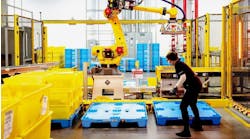How to capitalize on quantum computing (and avoid the quantum apocalypse) in your manufacturing business
“Quantum computing? Sure…sure…I know what that is.”
It’s a phrase we’ve all heard by now, but the concept of quantum computing is still unclear for many of us. Likewise, there is a lack of knowledge about how this computing trend can benefit manufacturers maturing into the IIoT era.
Here we chat with Jason Soroko, CTO of IoT at Sectigo, to learn more about quantum computing, explore some applications in the industrial space, and calm fears about the creepily termed ‘quantum apocalypse.” Take a look…
Smart Industry: Define quantum computing.
Jason: Quantum computing is, first and foremost, about speed. Back in 2015, Google claimed to have a quantum computer that was 100 million times faster than your current laptop. A search for recent quantum-computer news reports shows a back-and-forth declaration of ‘quantum supremacy;’ that is, who has the fastest quantum computer. But what we are really talking about here is the march of progress toward more and more ‘stable’ quantum computing.
Smart Industry: How is quantum computing applied in the manufacturing space? What unique challenges / opportunities are there in manufacturing?
Jason: Quantum computers will likely have an enormous impact when solving problems related to manufacturing-process optimization and machine designs. Their ability to work through massive combinations within models to discover new materials with specific properties will also greatly advance materials science and chemistry.
Quantum computing is a special topic area in quantum-information science. Unusual and counter-intuitive properties of quantum mechanics include entanglement and superposition, which can be utilized to perform special computational tasks.
This is where a traditional computer has two states: on and off. A quantum computer can also use a third state known as a superposition, which gives a quantum computer very unique capabilities such as solving integer factorization. A traditional binary computer solves that mathematical problem slowly, whereas a quantum computer with an efficient algorithm can solve that problem much more quickly. Traditional computers measure their data in bits, but quantum computers utilize a quantum bit or qubit. The main challenge for quantum computing is to keep qubits stable, which is a very important area of ongoing research and a requirement for commercialization of quantum computers.
While the process of building customized software to utilize quantum computing will take time, it is likely that much of the complexity will be hidden behind an abstraction layer—similar to the current set of rich offerings in public cloud computing. Immense computing power is available on demand. So the lifecycle of development for building, testing and continuous improvement of these systems for manufacturing will potentially be much like it is for traditional computing. What will be different is the immense speed. Models that may take days or months to compute could take seconds. In fact, real-time computing of massive datasets is one of the goals of quantum computing, thereby revolutionizing current processes and delivering new innovations for manufacturing and industry worldwide.
Smart Industry: How are existing cybersecurity solutions ill-equipped for quantum computing? What's the fix?
Jason: Current cryptographic algorithms such as RSA and Elliptic Curve (ECC) are based on factorization. Quantum computers can solve these problems much more quickly than a traditional computer using what is known as Shor’s Algorithm. How much faster? By a factor of a million. In turn, computing systems will need to utilize new cryptographic algorithms. In a nutshell, the fix is ‘cryptographic agility.’
Currently, industry organizations and many leading security-technology vendors are spending a lot of time and money researching new cryptographic algorithms that are resistant to quantum computing in general, and Shor’s Algorithm in particular, with a goal of ensuring that these algorithms will be available to secure information and communications before the current cryptographic algorithms are broken. While quantum computers are massively faster at solving many mathematical problems, they are not simply universally faster at all processing tasks and offer an advantage only for a limited set of mathematical problems. By using different mathematical approaches, it is possible to develop cryptographic algorithms that can be executed on traditional computers but that are resistant to attacks from quantum computers.
The solution is essentially a combination of new math alongside new PKI tools. Thankfully, some of the best minds on the topic have already been researching the most optimal quantum-resistant algorithms, from a security and performance standpoint.
Smart Industry: What is the quantum apocalypse? How do individuals / nations play a role?
Jason: Researchers theorize that when enough stable qubits are attained in a quantum computer, the current cryptographic algorithms will be rendered unsecure. That point in time is known as the ‘quantum apocalypse.’ It will take time to get there. The 2026 timeframe is generally considered the earliest that we may see this quantum apocalypse.
There has been a great deal of research to find the next generation of quantum-resistant algorithms, as well as standards development on encryption certificates that can act as an operational bridge between the current generation of algorithms and post-quantum resistant algorithms. In July 2020, the National Institute of Standards and Technology narrowed this down to 15 candidate algorithms.
The quantum computing being considered for most quantum apocalypse timeframes is more accurately known as ‘universal gate-based’ quantum computing. This represents quantum computing where stable qubits are needed to complete a calculation and minimize errors. Other forms of quantum computing exist, such as quantum annealing. While some experts believe that quantum annealing cannot be applied to use Shor’s Algorithm to break current encryption, other specialized algorithms have been or will be developed to factor large numbers using quantum-annealing machines. The end result is the possibility that quantum annealing, with less reliance on stable qubits, could bring forward the timing of the quantum apocalypse.
Individuals, enterprises and nations can play a role by participating in the research, but also by building proof-of-concept PKI systems that utilize post-quantum hybrid-certificate toolkits.
Smart Industry: What can IT teams in the manufacturing space do to protect themselves?
Jason: It is imperative that manufacturers who build devices that utilize PKI certificates for security, and that have a lifespan of more than 5-10 years, start planning on using cryptographic agility to span the current era into the quantum apocalypse timeframe. IoT devices commonly use PKI based certificates for authentication and encryption of data in transit. The current algorithms used today will not be the ones used by the end of life of those devices, and therefore a plan is needed. That is why it’s important to work with a certificate authority that is already tooled for cryptographic agility.
Smart Industry: What opportunities with quantum computing most excite you in the coming years?
Jason: Artificial intelligence (AI) lends itself to quantum computing. Imagine any kind of problem where patterns need to be quickly discerned from large datasets. That is the basis of the current trend toward AI technologies, and this power makes the application of quantum computing potentially very broad. Problems that are difficult to solve today, such as real-time decision making by autonomous vehicles or complex modelling to cure diseases or discover new materials, are problem sets that are highly optimized for solving by quantum computing.
One of the practical challenges with quantum computing is that it doesn’t lend itself to miniaturization like we enjoy with traditional computers. With the advent of public cloud computing, quantum computing may end up being far more democratized than what was first imagined. Not everyone will be able to have a quantum computer at home or in their pocket, but nearly everyone may have access to a quantum computer via cloud computing. So, we may eventually be using a combination of traditional computers and quantum computers without even knowing it. The future is very exciting.



